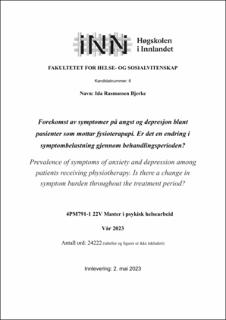Forekomst av symptomer på angst og depresjon blant pasienter som mottar fysioterapi. Er det en endring i symptombelastning gjennom behandlingsperioden?
Abstract
Sammendrag: Angstlidelser og depressive lidelser er blant de sykdommene som gir størst helsetap i Norge Av den norske befolkningen rammes rundt 25 prosent av angst og 20 prosent av depresjon i løpet av livet. Angst og depresjon gir både kroppslige og psykiske symptomer, og er ofte underdiagnostisert. Formålet med denne studien er å undersøke forekomst av symptombelastning på angst og depresjon hos pasienter som mottar fysioterapi, hvilke faktorer som er assosiert med høy symptombelastning og om det er endring i symptombelastning gjennom oppfølgingsperioden.Datamaterialet er innhentet gjennom forskningsprogrammet FYSIOPRIM, en database med systematisk innsamlet data med detaljert beskrivelse om pasientene som mottar fysioterapi (Evensen et al, 2018, s. 2). Inkludert i studien er 2615 pasienter. Informasjonen er samlet inn ved hjelp av digitale spørreskjema, fylt ut av pasienten alene eller sammen med fysioterapeut. Forskningsdesignet er en kvantitativ undersøkelse, med beskrivende tverrsnittstudier og utforskende panelstudier. Funnene tyder på at pasientene som mottar fysioterapi har en høyere andel som rapporterer høy symptombelastning, sammenliknet med den generelle befolkningen. Det å være singel, være student, stå utenfor arbeidslivet, å ha innvandrerbakgrunn, føle seg sliten og ha nedsatt søvnkvalitet er assosiert med høy selvrapportert symptombelastning på angst og depresjon. Rundt halvparten av pasientene fikk en reduksjon symptombelastning på angst og depresjon i løpet av perioden de mottok fysioterapi. Resultatene viser at kvinner, å være fysisk aktiv én dag i uka, ha lette eller moderate søvnproblemer eller føle seg veldig sliten, er assosiert med reduksjon i symptombelastning på angst og depresjon i løpet av behandlingsperioden. Alder og det å være på arbeidsavklaring er derimot assosiert med økning i symptombelastning i løpet av behandlingsperioden. Dette er funn som tydeliggjør viktigheten av å tenke helhetlig i fysioterapibehandling, ulike hensyn må tas og at tiltakene kan ikke nødvendigvis være like ut ifra funksjonsnedsettelse eller diagnose. Tiltak rettet mot søvnkvalitet og energiøkonomisering kan se ut til å spille en rolle for å oppnå ønskelig resultat for rehabiliteringen, samt for den enkeltes livskvalitet og psykisk helse. For fysioterapeuter er det viktig å motivere og tilrettelegge for fysisk aktivitet både som behandling og preventivt tiltak mot høy symptombelastning på angst og depresjon. Abstract:Anxiety and depression are among the illnesses that see the largest loss of health in the Norwegian population with a predicted onset that sees 25 percent of the population experiencing symptoms of anxiety and 20 percent depression. Both illnesses present physiological and psychological symptoms and they are often underdiagnosed. The aim of this study is to look at the prevalence of symptoms of anxiety and depression among patients receiving physiotherapy, to identify factors associated with high levels of self reported symptoms and if there are changes in symptom levels throughout the treatment period. The data material is obtained through the FYSIOPRIM research program and its database, the data is systematically collected with a detailed description of patients receiving physiotherapy. There are 2615 patients included in this study. The information is collected through digital surveys filled in by the patient either alone or with a physical therapist. The research design is a quantitative study, with descriptive cross-sectional and exploratory panel studies.The findings of the study indicate that patients receiving physiotherapy are more likely to score higher on symptom rating than the general population. The items most associated with high self-reported symptom score for anxiety and depression are being single, being a student, unemployment, having an immigrant background, feeling tired and reduced sleep quality. The study found that about half of the patients reported a reduction in symptoms for anxiety and depression throughout the period they received physical therapy. The results show that being female, having at least one physical activity during a week, small to moderate sleep problems and feeling exhausted are associated with symptom reduction throughout the treatment periode. Old age and receiving work assessment allowance are associated with an increase in symptoms throughout the treatment periode.These are findings that emphasize an integral approach to physiotherapy treatment, where individual considerations must be made and that the interventions may not necessarily need to be the same, based on functional impairment or diagnosis. Treatment measures for sleep quality and energy conservation seem to play a part in obtaining a desired result in rehabilitation, and for improving the patients mental health and quality of life. For physiotherapists it will be important to motivate and facilitate physical activity both as treatment and preventive measures against high symptoms of anxiety and depression.
